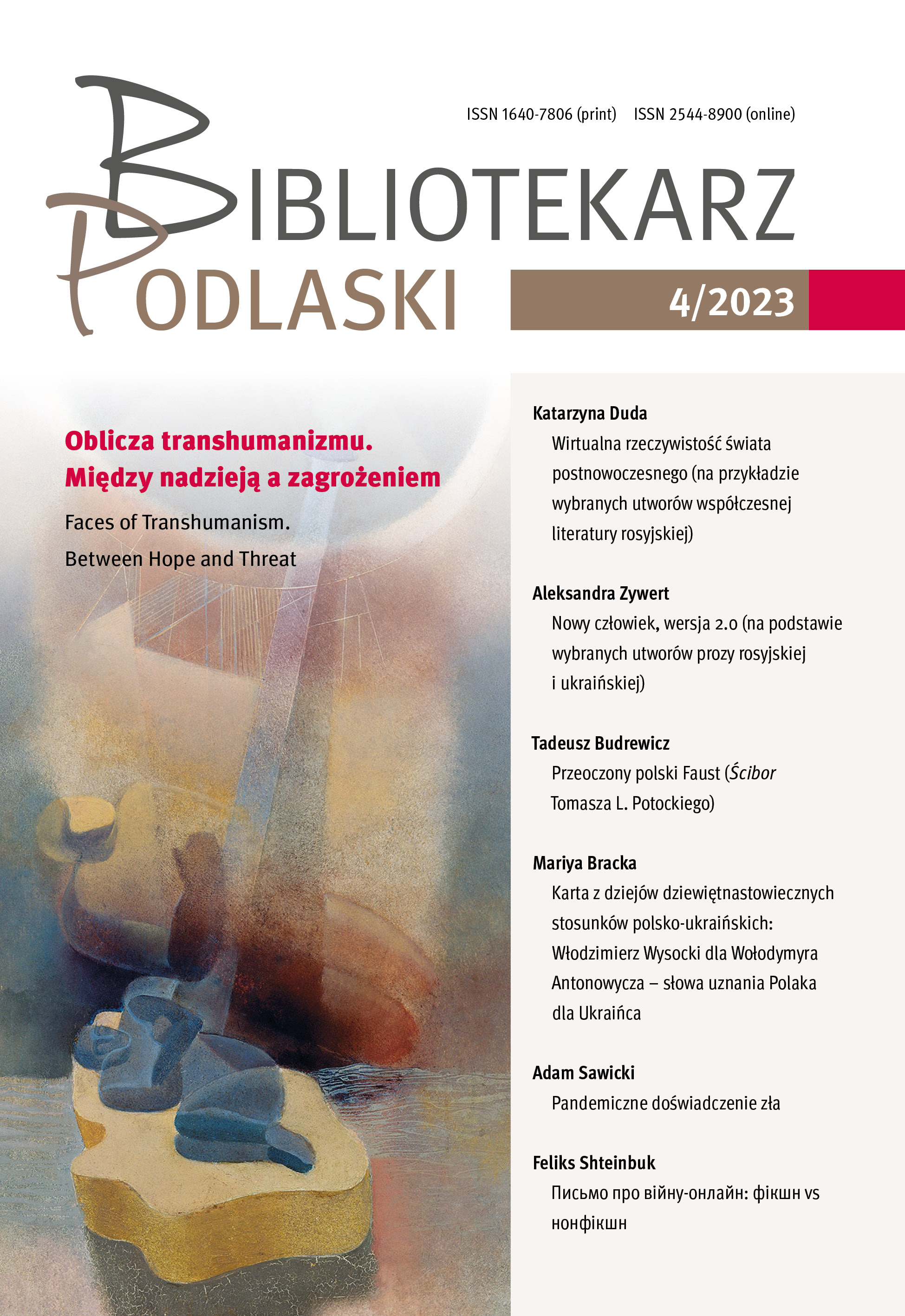Abstract
The aim of the article presented here is to define virtual reality in a post-modern world in which revolutionary technological transformations are taking place before our eyes. Thus, we are witnessing the implementation into our existence of new entities created in the first instance by the sciences including information technology, biotechnology, genetic engineering, and nanotechnology. The latter fields of knowledge have become our research object, with examples drawn from selected works of contemporary Russian literature. It turns out that transhumanism in Russia has its prehistory, for example, the cosmism of Nikolai Fyodorov, and is intensively developing in the present day, for example, the organisation, the Russian Transhumanist Movement. In terms of fiction related to the desire to transform homo sapiens into homo superior, Andrei Platonov, Yevgeny Zamiatin, Mikhail Bulgakov highlight this trend. In contemporary times, the themes of transhumanism, immortalism, cryonics, and artificial intelligence have been taken up by Tatyana Tolstaya, Olga Slavnikova, Victor Pelevin, Vladimir Sorokin, among others. On the pages of their novels, they present how utopia understood as a pipe dream is transformed into utopia – an experiment. The rapid development of civilization forces us to have moral doubts: “unfrozen” after a few hundred years, man may not adapt in a new environment. Artificial intelligence threatens to transform human beings into their replicas, cyborgs, taking over people’s jobs and threatening unemployment. This in turn contradicts the idea of eternal life, raising questions about whether replicas of humans will be endowed with consciousness and emotions, or whether humans transformed from creatures to creators will still remain human.
References
Bauman Z., Płynna nowoczesność, tłum. T. Kunz, Kraków 2006.
Bułhakow M., Psie serce, tłum. B. Dohnalik, Warszawa 2018.
Całus K., Transhumanizm – wizja nowego człowieka, „Historia Filozofii” 2018, nr 4.
Cieślak A., Golem czy postczłowiek? Transhumanizm z perspektywy nie-ludzkiej, „Acta Humana” 2013, nr 4.
Courtine J.J., Wprowadzenie, [w:] Historia ciała. Różne spojrzenia. Wiek XX, red. tenże, tłum. K. Belaid, T. Stróżowski, Gdańsk 2020.
Dawkins R., Samolubny gen, tłum. M. Skoneczny, Warszawa 2003.
Dostojewski F., Biesy, tłum. A. Pomorski, Kraków 2021.
Dudek A., Władimira Wojnowicza odkrywanie zamysłu, czyli „Życie jakie jest”, [w:] Realiści i postmoderniści. Sylwetki współczesnych rosyjskich pisarzy emigracyjnych, red. L. Suchanek, Kraków 1997.
Grof S., Poza mózg. Narodziny, śmierć i transcendencja w psychoterapii, tłum. J. Szewczyk, Kraków 1999.
Huxley A., Nowy wspaniały świat, tłum. B. Baran, Warszawa 2011.
Jaskuła S., Korporowicz L., Kultury narodowe w procesie wirtualizacji, „Politeja” 2014, nr 31.
Kamińska M., Niecne memy. Dwanaście wykładów o kulturze Internetu, Poznań 2011.
Marzec A., Antropocień. Filozofia i estetyka po końcu świata, Warszawa 2021.
Mercer C., Religion and Transhumanism. The Unknown Future of Human Enhancement, “Praeger”, 17 listopada 2014.
Minajew S, Duchless. Opowieść o nieprawdziwym człowieku, tłum. P. Podmiotło, Warszawa 2007.
More M., Transhumanism. Towards a Futurist Philosophy, http://web.archive.org/web/20130806172107/http://www.maxmore.com:80/transhum.htm [dostęp: 30.10.2022].
Pearce D., The Hedonistic Imperative, www.hedweb.com//hedethic/hedon2.html [dostęp: 30.10.2022].
Pielewin W., Napój ananasowy dla pięknej damy, tłum. E. Rojewska-Olejarczuk, Warszawa 2014.
Pielewin W., S.N.U.F.F., tłum. A. Janowski, Konin 2018.
Remnick D., Zmartwychwstanie. Walka o nową Rosję, tłum. M. Słysz, Warszawa 1997.
Robski O., Casual. Zwyczajna historia. Dyskretny urok rosyjskiej burżuazji, tłum. M. Buchalik, Kraków 2006.
Sławnikowa O., 2017, tłum. O. Morańska, Katowice 2013.
Supa W. Probliemy antropologii buduŝcego v sovremennoj russkoj proze, (Проблемы антропологии будущего в современной русской прозе), [w:] W kręgu problemów antropologii literatury. Antropologia przyszłości, red. W. Supa, E. Pańkowska, Białystok 2018.
Sykulski L., Rosja i postczłowiek. Rosyjski transhumanizm i idea nieśmiertelności, „Rosyjska Geopolityka”, 11 listopada 2019.
Szacki J., Spotkania z utopią, Warszawa 2000.
Tołstoj T., Kyś, tłum. J. Czech, Kraków 2004.
Wojnowicz W., Moskwa 2042, tłum. H. Broniatowska, Warszawa 1992.
Zywert A., Przekleństwo nieśmiertelności. Rozważania o niesubordynacji (Dmitrij Głuchowski FUTU.RE), [w:] W kręgu problemów antropologii literatury. Antropologia przyszłości, red. W. Supa, E. Pańkowska, Białystok 2018.
Źródła internetowe
http://transhuman.ru/movement [dostęp: 30.10.2022].

This work is licensed under a Creative Commons Attribution-ShareAlike 4.0 International License.
Copyright (c) 2024 Katarzyna Duda


